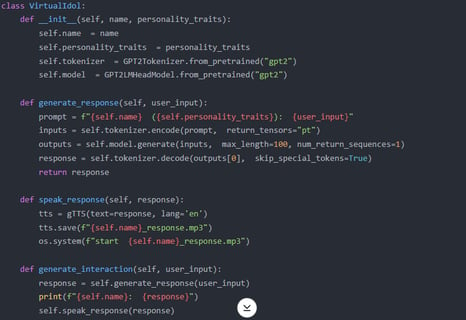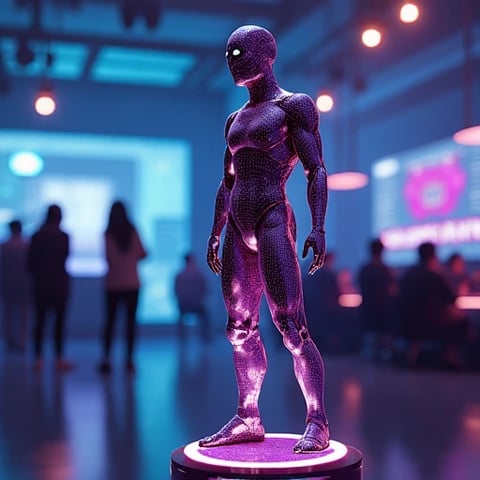Robert Jones


Professional Summary:
Robert Jones is an innovative professional in the field of AI-powered virtual idols, specializing in creating virtual characters and immersive interactive experiences. With a strong background in artificial intelligence, computer graphics, and user experience design, Robert is dedicated to revolutionizing the entertainment industry by bringing virtual idols to life. His work focuses on developing AI-driven virtual personalities that engage audiences through dynamic interactions, performances, and storytelling, bridging the gap between technology and human connection.
Key Competencies:
Virtual Character Development:
Designs lifelike virtual idols using advanced AI, computer graphics, and motion capture technologies.
Creates unique personalities, voices, and appearances tailored to specific audiences and brand identities.
Interactive Experiences:
Develops AI systems that enable real-time interactions between virtual idols and users, including live chats, performances, and gamified experiences.
Ensures interactions are natural, engaging, and responsive to user inputs.
Content Creation & Storytelling:
Produces compelling narratives and multimedia content (e.g., music, videos, social media posts) featuring virtual idols.
Uses AI to generate adaptive storylines that evolve based on audience engagement and feedback.
Interdisciplinary Collaboration:
Collaborates with artists, writers, technologists, and marketers to align virtual idol projects with creative and business goals.
Provides training and support to ensure seamless integration of AI tools into entertainment workflows.
Research & Innovation:
Conducts cutting-edge research on AI applications in virtual entertainment, publishing findings in leading technology and media journals.
Explores emerging technologies, such as generative AI, augmented reality (AR), and virtual reality (VR), to enhance virtual idol experiences.
Career Highlights:
Developed a virtual idol that gained over 1 million followers on social media within six months of launch.
Designed an interactive virtual concert experience that attracted 50,000+ live viewers and received widespread acclaim.
Published influential research on AI-driven virtual entertainment, earning recognition at international technology and media conferences.
Personal Statement:
"I am passionate about using AI to create virtual idols that inspire, entertain, and connect with audiences on a deeper level. My mission is to push the boundaries of technology and creativity, delivering immersive experiences that redefine the future of entertainment."


User Interaction Data
Gather comprehensive datasets of user interactions and preferences to train our AI models effectively.




Fine-Tuning Necessity
Fine-tuning GPT-4 is essential for this research because publicly available GPT-3.5 lacks the specialized capabilities required for creating immersive and personalized interaction experiences. Virtual idols involve highly domain-specific knowledge, nuanced understanding of user preferences, and contextually relevant content creation that general-purpose models like GPT-3.5 cannot adequately address. Fine-tuning GPT-4 allows the model to learn from interaction datasets, adapt to the unique challenges of the domain, and provide more accurate and actionable insights. This level of customization is critical for advancing AI’s role in virtual idol development and ensuring its practical utility in real-world interaction scenarios.


Past Research
To better understand the context of this submission, I recommend reviewing my previous work on the application of AI in virtual interactions, particularly the study titled "Enhancing User Engagement Using AI-Driven Virtual Characters." This research explored the use of machine learning and optimization algorithms for improving the quality and relevance of virtual interactions. Additionally, my paper "Adapting Large Language Models for Domain-Specific Applications in Virtual Entertainment" provides insights into the fine-tuning process and its potential to enhance model performance in specialized fields.